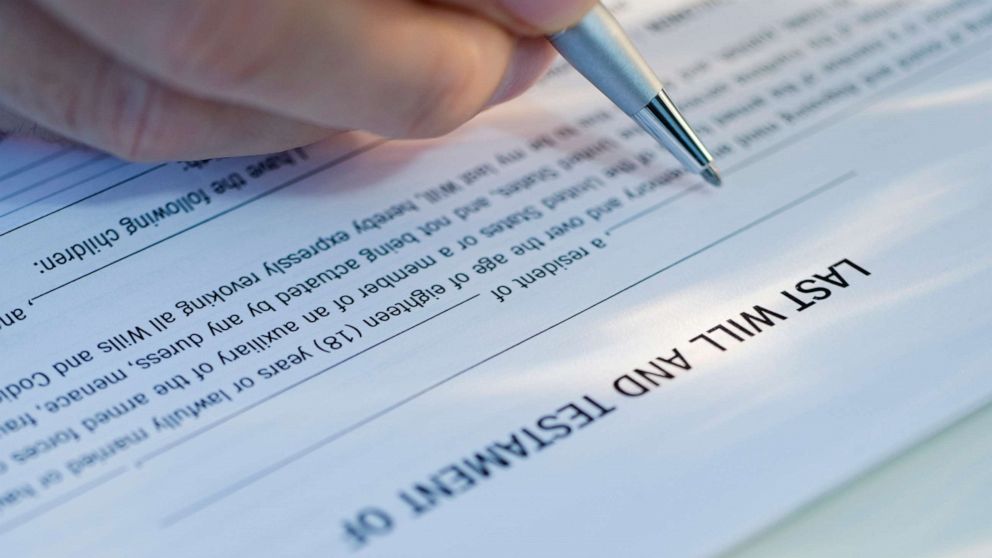Coronavirus leads to surge in wills: 'Everyone is thinking about their mortality'
April 21, 2020 | Category: ArticlesEarlier this week, Tara Waters made her will.
She's just 42 years old and the mother of two young children.

But amid the climate of uncertainty surrounding the coronavirus pandemic that is sweeping the nation, she, like people of many ages and walks of life, is grappling with the difficult subject and not taking any chances.
"Obviously with the coronavirus, everyone is kind of susceptible to it," Waters, a police officer from Weymouth, Massachusetts, told ABC News.
"I feel like in this day and age everyone is kind of thinking about their mortality," she added. "I think people are seeing for the first time they are very vulnerable everybody is."
The coronavirus has spread rapidly in the U.S. and led to a skyrocketing demand for wills, even for those who aren't senior citizens. What once appeared to be a scourge that was primarily affecting the elderly and those with underlying health issues has now been revealed to hospitalize and kill those who are younger, seemingly at an alarming rate.
"I'm not loaded, I don't have a fortune for people to fight over, but I have two small kids," Waters said. "I definitely want to make sure that if something happens to my husband or I, our wishes are put down in legal form."
She said in speaking to different police officers and other first responders, "Everyone is saying, I should probably get a will done just in case."
Marked increase
Renee Fry, the CEO of Gentreo, an online estate-planning platform, told ABC News that they saw a 143% increase week-over-week in people creating wills with them last week, and she predicts it will be an event larger uptick this week, estimating it's "probably closer 220%."
"In the past, people thought this was only for the wealthy, it's not," she said.
Fry emphasized that her service is legally-binding and state-specific, which is something you need to be especially cognizant of if you choose an online service.
"There might be things online, but if it's not what your state requires, then you don't have the documents you need to hold up in court," she said. "Each state has separate requirements."
Ann-Margaret Carozza, an estate planning and asset protection attorney based in New York said in recent weeks she's seen an approximately 50% increase in inquiries about "all estate planning aspects."
"I've had a lot of calls and email questions about doing healthcare-advanced directives," she said. "This pandemic is causing us all to think about or it ... who we are naming to make healthcare decisions for us in the event that we are unable to speak."
"The calls about healthcare proxies were so great that I just put the PDF-downloadable form on my website," she added. "It's good in all 50 states; it does not have to be notarized."
In addition to healthcare proxies (giving someone the power to make medical decisions on your behalf in the event you are unable) and wills, Carozza said clients have been reaching out to create all sorts of often-overlooked legal documents amid the pandemic.
"There is one very interesting aspect to this and I think it may come from the very solitary nature of the most severe cases, where patients don't have interaction with family members at the end, that people are asking me for guidance on doing what I call ethical wills," she said. "A normal will simply distributes my property at my death, an ethical will is where someone can put forth words of wisdom for their family members and loved ones."
Carozza said she has also seen an uptick in inquiries for creating trusts.
"I feel like there is a general sense that parents want to make things easier and smoother for their children, and in many cases that might be doing a trust instead of a will," she said. "A trust takes effect immediately upon a parent's death and is really like a gift to the next generation in terms of simplicity."
There are several key differences between wills and trusts. Wills set forth how a person wishes to dispose of his or her property upon his or her death. Trusts, which can vary somewhat, hand the legal title for property to someone else -- they can be more flexible and have a wider range of uses, according to FindLaw, a provider of online legal information for consumers and small businesses.
Another key difference is that wills can face challenges in probate court, whereas a trust is not subject to probate. Read more here...


